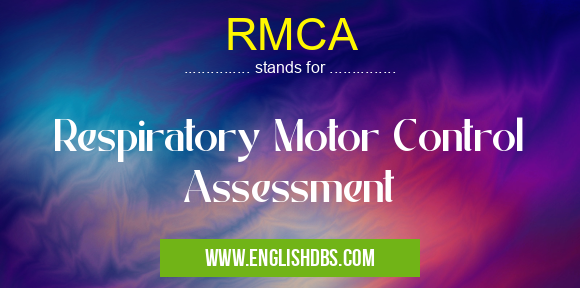What does RMCA mean in UNCLASSIFIED
The RMCA is a comprehensive clinical test that evaluates the function of the respiratory muscles and nerves, which are responsible for breathing. It is used to diagnose and manage conditions that affect breathing, such as neuromuscular disorders, spinal cord injuries, and chronic respiratory diseases.

RMCA meaning in Unclassified in Miscellaneous
RMCA mostly used in an acronym Unclassified in Category Miscellaneous that means Respiratory Motor Control Assessment
Shorthand: RMCA,
Full Form: Respiratory Motor Control Assessment
For more information of "Respiratory Motor Control Assessment", see the section below.
Key Features of RMCA
- Comprehensive Evaluation: RMCA assesses various aspects of respiratory motor control, including breathing patterns, muscle strength, endurance, and coordination.
- Objective Measures: The assessment utilizes objective measurements, such as pressure transducers and electromyography, to quantify respiratory function.
- Clinically Relevant: RMCA is widely used in clinical settings to diagnose and manage respiratory disorders, such as chronic obstructive pulmonary disease (COPD), neuromuscular conditions, and sleep-disordered breathing.
Uses and Benefits of RMCA
- Diagnostic Tool: RMCA assists in diagnosing respiratory conditions by identifying abnormal breathing patterns, muscle weakness, or coordination issues.
- Treatment Planning: The assessment guides treatment planning by providing a detailed profile of respiratory muscle function, informing decisions on interventions such as respiratory rehabilitation, breathing exercises, and mechanical ventilation.
- Monitoring Progress: RMCA can be used to monitor treatment progress and assess the effectiveness of respiratory interventions.
Essential Questions and Answers on Respiratory Motor Control Assessment in "MISCELLANEOUS»UNFILED"
What is the Respiratory Motor Control Assessment (RMCA)?
How is the RMCA performed?
The RMCA typically involves a series of procedures, including:
- Measuring lung volumes and capacities using spirometry
- Assessing muscle strength and endurance of the respiratory muscles
- Evaluating the function of the respiratory nerves using electromyography (EMG)
- Determining the coordination and timing of the respiratory muscles
What conditions can the RMCA diagnose?
The RMCA can identify a wide range of respiratory conditions, including:
- Neuromuscular disorders, such as amyotrophic lateral sclerosis (ALS) and myasthenia gravis
- Spinal cord injuries
- Chronic obstructive pulmonary disease (COPD)
- Restrictive lung diseases, such as interstitial lung disease
- Obstructive sleep apnea
How is the RMCA interpreted?
The results of the RMCA are interpreted by a qualified healthcare professional, typically a pulmonologist or neurologist. They will consider the patient's symptoms, medical history, and the results of other tests to determine the underlying cause of the respiratory dysfunction.
What are the benefits of the RMCA?
The RMCA provides valuable information for diagnosing and managing respiratory conditions by:
- Identifying the specific muscles or nerves that are affected
- Determining the severity of the respiratory dysfunction
- Monitoring the progression of the condition
- Guiding treatment decisions and rehabilitation plans
Final Words: RMCA is a valuable assessment tool in the field of respiratory medicine. It provides comprehensive and objective information on respiratory motor control, enabling healthcare professionals to accurately diagnose and manage respiratory disorders, optimize treatment plans, and monitor patient progress.
RMCA also stands for: |
|
| All stands for RMCA |
